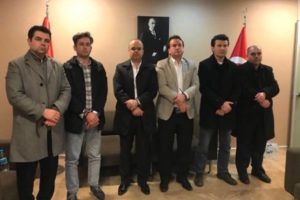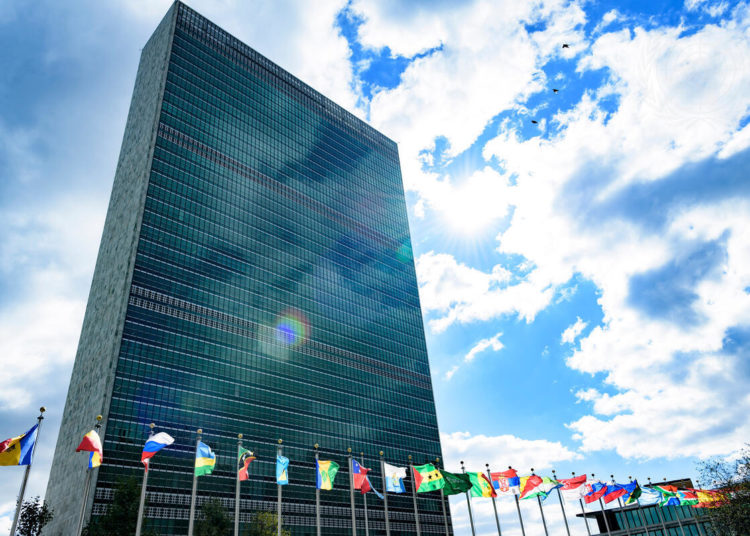Abdullah Bozkurt/Stockholm
The United Nations hailed the court proceedings against Kosovar officials who were involved in the abduction of critics of Turkish President Recep Tayyip Erdoğan by Turkey’s National Intelligence Organization (MIT).
In a report issued by the UN secretary-general on April 12, 2022 on the work of the UN Interim Administration Mission in Kosovo (UNMIK), confirmation of the conviction of the Kosovar officials who helped Turkish intelligence abduct six Turkish nationals in a clandestine operation was cited as part of the development of the rule of law and human rights in Kosovo.
According to the UN the appeals court in Kosovo confirmed “indictments for abuse of official position or authority against the former heads of the Kosovo Intelligence Agency, the Department for Citizenship, Asylum and Immigration in the Ministry of Internal Affairs and the Directorate for Migration and Foreigners in the Kosovo Border Police, respectively.”
The ruling, rendered on December 17, 2021 by the Special Department of the Court of Appeals, upheld an earlier decision of the Special Department of the Basic Court of Pristina regarding the expulsion in March 2018 of six Erdoğan critics from Kosovo in violation of Kosovo laws.
Kosovar authorities initiated criminal prosecution, indictments and court proceedings after six Turkish nationals were illegally taken out of the country by the Turkish intelligence agency in March 2018, apparently aided and abetted by some Kosovar officials.
The incident sparked a crisis in Kosovo, with the prime minister saying he was not informed in advance of the operation, immediately sacking the interior minister and security chief.
UN secretary-general’s progress report on Kosovo:
Six people, including five teachers and one doctor affiliated with the Gülen movement, a group critical of President Erdoğan, were arrested as soon as they were brought to Turkey and jailed on fabricated charges of terrorism.
The Erdoğan government brands most of its critics and opponents as terrorists and jails many under the country’s abusive anti-terrorism laws with no evidence of the commission of violent or terrorist acts. Turkey is by far the leader in the number of prisoners convicted of terrorism in Europe according to a 2021 Council of Europe report. The country hosts 95 percent of all inmates in Europe who were imprisoned on terrorism convictions.
The Turkish nationals — Cihan Özkan, Kahraman Demirez, Hasan Hüseyin Günakan, Mustafa Erdem, Yusuf Karabina and Osman Karakaya — had nothing to do with terrorism, but they were affiliated with a government critic.
Erdem was the general director of the Gülistan Education Institutions; Karabina was assistant director; Demirez was the principal of a school in Gjakova; Özkan and Günakan were working as teachers. They had long been residents of Kosovo. Cardiology professor Karakaya had recently moved to the country to escape the persecution of the Erdoğan regime in Turkey.
In September 2020 the United Nations Working Group on Arbitrary Detention (WGAD) stated that the arrest, detention and forced transfer to Turkey of the people by Kosovar and Turkish state agents were arbitrary and in violation of international human rights norms and standards, calling on Turkey for their immediate release.

Turkey’s Pristina embassy was key to the logistics and planning of the abduction and served as a detention center for the operation in Kosovo. The Turkish nationals were kept for a time at the embassy chancery or at the residence of then-Turkish Ambassador Kıvılcım Kılıç. The Cumhuriyet daily reported that pictures were taken on Turkish Embassy premises by the state-run Anadolu news agency after their detention.
In 2021 a court in Pristina accepted the indictment of three officials involved in the illegal deportation of the six Turks to Turkey: Driton Gashi, former head of the Kosovo Intelligence Agency; Valon Krasniqi, director of the Department of Citizenship and Migration at the Interior Ministry; and Rrahman Sylejmani, head of the Directorate of Migration and Foreigners in the Kosovo Border Police. All three were convicted, and the rulings were upheld on appeal.

Critics of the Erdoğan government abroad, in particular members of the Gülen movement, have been facing surveillance, harassment, death threats and abduction since President Erdoğan decided to scapegoat the group for his own legal troubles in a graft case in 2013. They have often been denied consular services such as power of attorney and birth registry as well as having their passports revoked. Their assets in Turkey are seized and their family members at home risk criminal charges.
More than 100 alleged members of the Gülen movement have been abducted abroad by Turkish intelligence and brought back to Turkey as part of the Turkish government’s global manhunt. They were reportedly subjected to torture and ill-treatment and were denied the right to a fair trial.












